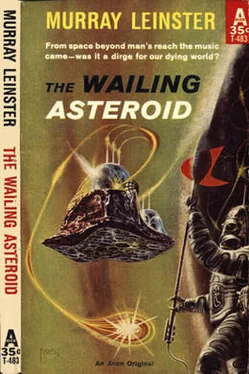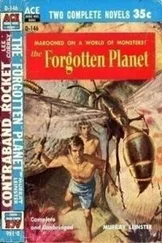"To stay in the party," Sandy said suddenly, with something like defiance, "I tried a cube, too. And I was a sort of supply–officer. I had the experience of being responsible for supply and being short of everything and improvising this and that and the other to keep things up to fighting standard. It wasn't easy. The men grumbled, and we lacked everything. There was no fighting in my time, and there hadn't been for centuries. But we knew the Enemy hadn't given up and we had to be ready, generation after generation, even when nothing happened. And we knew that any minute the Enemy might throw something unexpected, some new weapon, at us."
"History–cubes," said Keller interestedly. "Different periods. Right?"
"Dammit, yes!" said Burke. "We've got accounts of past times and finished battles, but we need to know who's coming and what to do about it! Maybe the rocket–dream was earliest in time. But how could a race with nothing better than rockets ever get here? And how could they supply the building of a place like this?"
There was no answer. Facts ought to fit together. When they don't, they are useless.
"We've got snatches of information," said Burke. "But we don't know who built this fort, or why, except that there was a war that lasted thousands of years, with pauses for centuries between battles." He waved a hand irritably. "The Enemy tries to think up new weapons. They do. They try them. So far, they've been countered. But we're not prepared to fight a new weapon. Maybe the fort is set to battle old ones, but we don't know how to use it even for that! We've got to—"
"I think—" began Keller.
"I'd give plenty for a service manual on the probably useless weapons we do have," said Burke angrily. "Incidentally, Keller just found what may be an explanation of how and why this place was abandoned."
Keller said suddenly, "Where would service manuals be?"
He moved, almost running, toward the air–lock. Burke started to swear, and stopped.
"A service–and–repair manual," he snapped, "would be near the equipment it described. How many little shelves with boxes on them have we seen? They're just the right size to hold cubes! And where are they? Next to those fighting machines next to the door of the room where the ten–foot globes are! There's a shelf of them in the instrument–room! Let's find out how to fight with this misbegotten shell of a space–fort! There'll be no help coming to us, but if the Enemy's held off for thousands of years while this civilization fell apart, we might as well try to hold it together for a few minutes or seconds longer! Let's go get some real instruction–cubes!"
Keller was already gone. The others followed. Once they saw Keller in the far, far distance, hastening toward the instrument–room. Behind him, after almost running down the long corridor, Burke swung into the room where hundreds of ten–foot metal globes waited for the fortress to be remanned and to go into action again. Inside the door he found the remembered shelf, with two small boxes fastened to it. He pulled down one box and opened it. There was a black cube inside it. He thrust it upon Holmes.
"Here!" he said feverishly. "Find out how those globes work! Find out what's in them, how they drive!"
He ran. To the end of the corridor and up the ramp and past the supposed bunk–rooms and mess–halls. Up to the level where the ugly metal machines stood, each in its separate cubicle. There were little shelves inside each door. Each shelf contained a single box. Burke took one, two, and then stopped short.
"They'll be practically alike," he muttered. "No need."
He put one back. And then he felt almost insanely angry. One would need at least to be able to doze, to make use of the detailed, vivid, and utterly convincing material contained in the black cubes. And how could any man doze or sleep for the purpose of learning such desperately needed data? He'd need almost not to want the information to be able to sleep to get it!
Sandy and Pam overtook him as he stood in harried frustration with a black cube in his hands.
"Listen to me, Joe," said Sandy. "We've all taken chances, but if you get recurrent dreams from every cube you doze near—"
"When that happened to me," snapped Burke, "I was eleven years old and had one moment only. And that dream wasn't affected by the others in the cubes that came after it. And anyhow, no matter what happens to Holmes and me, we have to get these things ready for use! I don't know what we'll use them against. I don't know whether they'll be any use at all. But I've got to try to use them, so I've got to try to find out how!"
Sandy opened her mouth to speak again.
"I'm going off to fret myself to sleep," added Burke. "Holmes will be trying it too. And Keller."
"I don't think it's necessary," said Sandy.
"Why?"
"You found a sort of library of cubes. How useful would they be if one had to doze off to read them? How handy would a manual about repairing a weapon be, if somebody had to take a nap to get instructions? It wouldn't make sense!"
"Go on!" said Burke impatiently.
"Why not look in the library?" asked Sandy. "As a quartermaster officer, I think I knew that there was a reading–device for the cubes, like a projector for microfilm. It might have been taken away, but also—"
"Come along!" snapped Burke. "If that's so, it's everything! And it ought to be so!"
They hastened to the vast, low–ceilinged room which was filled with racks of black cubes. They were stacked in their places. At the far corner they found a desk and a cabinet. In the cabinet they found two objects like metal skull–caps, with clamps atop them. A cube would fit between the clamps. Burke feverishly sat a cube in position and put the skull–cap on his head. His expression was strange. After an instant he took it off and reversed the cube. He put it on. His face cleared. He lifted it off.
"I had it on backwards the first time," he said curtly. "This is better than dreaming the stuff. This lets you examine things in detail. You know you're receiving something. You don't think you're actually experiencing. We'll get this other reading–machine to Keller, so he can understand the equipment in the instrument–room. Holmes will have to wait."
Sandy said, "I can use him. Doesn't it occur to you, Joe, that we've only partly explored the top half of the fortress? We've only looked at what's between us and the instrument–room. There are all the stores—there were stores! And the generators down below. I can lead the way there now!"
"What do you know about the weapons?" demanded Burke.
"Nothing," said Sandy. "But I know something about the morale of the garrison. When grumbling began, discipline tightened up. And that worked for the men, but the women—"
"Women!" said Pam incredulously.
"They were an experiment," Sandy told her, "to see if they would content men on duty in an outpost. It'd been going on for only a few hundred years. It didn't seem to work too well. They wanted supplies that weren't exactly military, and at the time the cube I used was made, there was trouble getting even military things!"
Burke said impatiently, "I'll get one of these things to Keller. That's the most important thing. Tell Holmes not to try to sleep. Take him down to look over the supplies, if there are any. I'd guess that the garrison took most of them along. I doubt there's much left that we could use."
He made his way out of the cube–library and vanished.
Pam said uncomfortably, "Joe dreamed about a woman and is no good to you, in consequence. If there were women in this garrison, using the cubes might make anybody—"
Sandy tensed her lips.
"I don't think Joe is thinking about his old dream. Something deadly's on the way here. His mind's on that. I suspect all three of the men are concentrating on it. They're in no mood for romance."
Читать дальше







